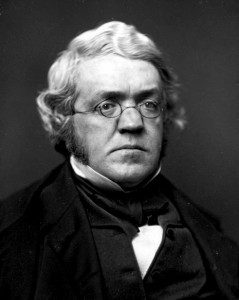 Mostly well-known for being a novelist, particularly for his work Vanity Fair, William Makepeace Thackeray was also a poet of some repute and published a number of verses during his lifetime. He was born in Calcutta, India, in 1811 but his father died just a few years later and his mother promptly sent the young Thackeray back to England where he went to school in Southampton and then Chiswick, near London.
Mostly well-known for being a novelist, particularly for his work Vanity Fair, William Makepeace Thackeray was also a poet of some repute and published a number of verses during his lifetime. He was born in Calcutta, India, in 1811 but his father died just a few years later and his mother promptly sent the young Thackeray back to England where he went to school in Southampton and then Chiswick, near London.
In his later youth, Thackeray went to Charterhouse School which he didn’t much care for, and would later parody, before heading to Cambridge where he first began to write poetry. He was not the most academically gifted or serious of students and left after two years, choosing instead to travel in Europe for a while. Although Thackeray received an inheritance when he reached twenty one, he lost most of it either gambling, investing poorly or living too much of the social high life.
The turning point in his life came in 1836 when he married Isabella Shawe with whom he would eventually have three children. This change in circumstance led him to pursue his career as a writer more seriously, firstly in journalism where he worked for the conservative publication Frazer’s Magazine. By 1837 he was also finding an outlet by writing book reviews for The Times and later began to produce satirical work for the newly created Punch magazine.
After the birth of their third child, Thackeray’s wife began to suffer from depression and tried to commit suicide on a boat trip to Ireland. Her condition deteriorated even though he looked after her and searched for every possible cure but she was eventually sent to a home near Paris where she remained for the rest of her days. In 1840, now for all intent a widower, Thackeray achieved some success with two travel books about Paris and Ireland and first published Vanity Fair in installments at the beginning of 1847.

Many saw him as the best Victorian writer since Dickens and his celebrity suddenly grew as he was courted by the same people he had so harshly satirized in Vanity Fair. A number of novels followed over the next ten years, including Pendennis and The History of Henry Esmond, which Anthony Trollope said was the writer’s greatest work.
Thackeray was known for his simple use of vocabulary and a lively style in his poetry, something that set him apart from his compatriot Dickens. These were the light, whimsical verses of polite society and may well have been seen as a less serious diversion in comparison to his more satirical prose works such as The Luck of Barry Lyndon and The Book of Snobs.

Unfortunately, with his new success, Thackeray also began to suffer from long term health problems, some of which left him debilitated for days. He was also known for his gluttonous habits and rarely took any form of exercise and, in 1863, after a dining out with friends, Thackeray suffered a stroke whilst undressing for bed. He was 52 and over 7,000 mourners attended his funeral in Kensington Gardens.

